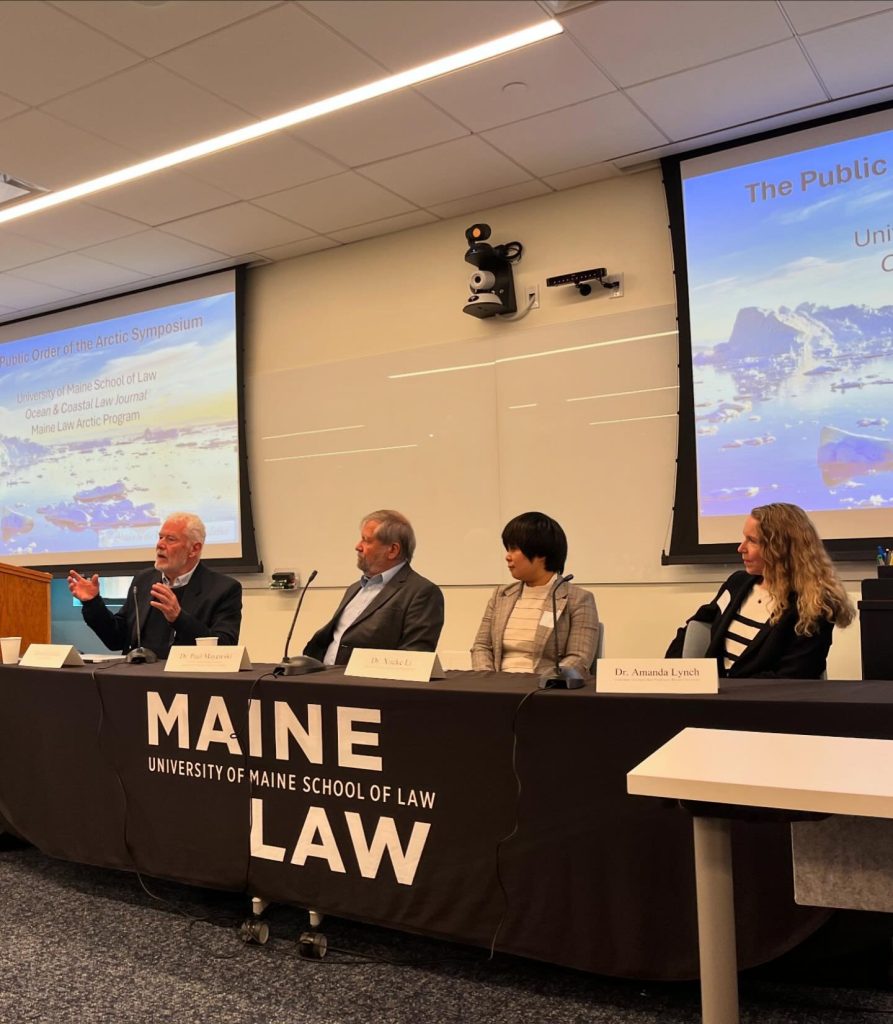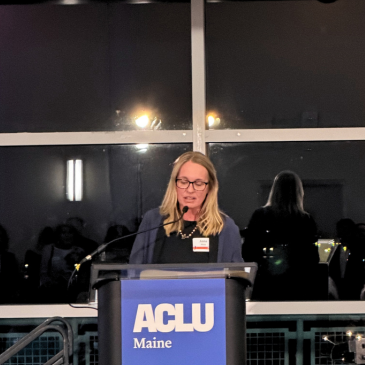Maine is strategically leading the way in U.S. – Arctic relations and policy.
This was underscored during Maine Law’s recent Ocean and Coastal Law Journal Symposium on the Public Order of the Arctic. The event was organized by Maine Law Benjamin Thompson Professor Charles Norchi and OCLJ leadership, including Editor-in-Chief Alicia Rea, Managing Editors Natalie Nowatzke and Mollie Rutz, and Executive Editor Austin Clark. The Symposium was supported by the United States Russia Foundation.
The Symposium was well attended and drew attendees from all corners of the world and across a variety of professions, including Kenneth Høegh, the Head of the Greenland Representation in the U.S. and Canada.
Maine is roughly a 4.5 hour direct flight from Greenland’s west coast, is a leader in industries like fishing, forestry, and hydroponic agriculture, is home to a major East Coast port, and has long proved a nexus of maritime research and industry. It seems clear Maine is moving towards a future intertwined geopolitically and economically with Arctic regions.
This future is approaching faster than many anticipated. Because of its many climate and geographic vulnerabilities, events like climate change and international conflict often become magnified in the Arctic region. Roughly 90 lawyers, academics, students, dignitaries, and industry professionals gathered from around the world on April 18-19 to discuss the threats, concrete and existential, facing the Arctic and the many opportunities it also offers.
“I see Maine and Maine Law becoming a crucial marine and Arctic center for the world,” Edward Girardet, editor of the publication Global Geneva said. “ You have an extraordinary asset here. Develop it.”

Girardet moderated the panel on climate change, which included presentations about how climate change is rapidly shifting the Arctic landscape in ways that have global resonance.
“We are already seeing responses of the effects of climate change in the Arctic,” panelist and Brown University Environmental Studies Professor Amanda Lynch said. “We see increased militarization, resource exploitation, competitive resource extraction, and claims for enhanced sovereignty.”
These issues do not exist in silos, they intersect and influence each other, which is why Dr. Lynch said it’s essential for scientists, lawyers, policy makers, and others to work closely and exchange knowledge through forums like the OCLJ Symposium.
“The science has more impact if we can engage with the legal side of things,” she added.
Climate change was a theme that threaded its way throughout all the talks during the Symposium, from panels on Indigenous Arctic communities to talks on international security.
Indigenous peoples of the Arctic risk losing not only livelihoods like reindeer farming due to climate change but are also in the process of losing their cultural identities, according to Vera Solovyeva, an Environmental Sciences postdoctoral student at George Mason University and Indigenous Sakha of northeastern Russia.

The complications wrought by climate change are often compounded for indigenous populations because of their already vulnerable status.
“Being invisible inside Russia and to the rest of the international community perpetuates many of the problems we face from climate change,” Dr. Solovyeva explained.
Russia featured heavily in discussions, not just around Indigenous populations but also in regards to international security and relations in the Arctic. Russia stretches along 53% of the Arctic Ocean and 2.5 million Russians live inside the Arctic Circle, comprising nearly half the population of the region.
As discussed by panelist Raul Pedrozo, a Professor of International Law at the United States Naval War College, this is a cause for concern among NATO countries, especially as Russia’s conflict with Ukraine drags on.
Dr. Norchi concluded the conference by inviting its participants to continue to work in tandem and engage across disciplines.
The symposium was a reflection of the forthcoming issue of the Ocean and Coastal Law Journal, which will be published this summer.
“The Ocean and Coastal Law Journal staff looks forward to publishing the accompanying topical issue, given its wide breadth of information on the Public Order of the Arctic,” said Rea.








